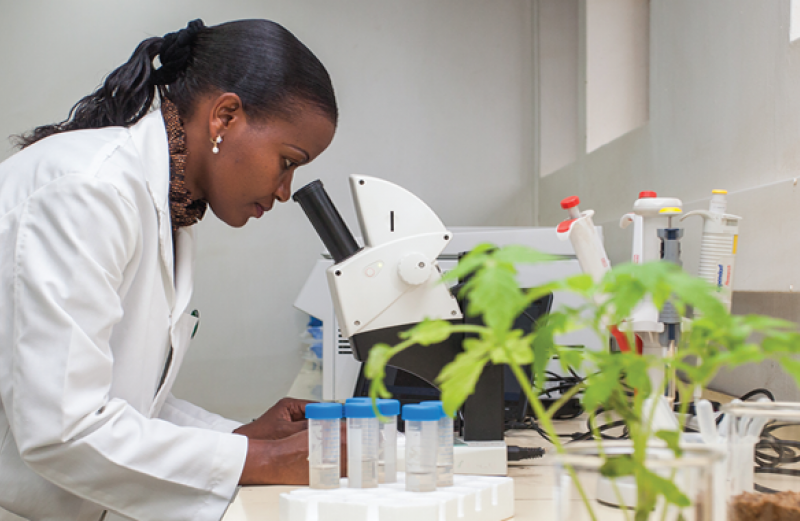Mozambican entrepreneurs lend glamor to agriculture science

By Charles Mangwiro
Suzete Zita, 37 and a mother of four who produces yogurt from underutilized fruits such as Vangueira Infausto and Baobab fruit, examines plants at her rural home in the district of Manhica, some 75 Kms north of the capital, Maputo.
Vangueria infausta, or the African medlar, is a species of plant in the family Rubiaceae, which is native to the southern and eastern Afrotropics and the fruits have a pleasant apple-like flavor. Baobab is the exceptional superfruit of Africa's 'Tree of Life' and it is the only fruit in the world that dries naturally on the branch.
The 37-year-old former petrol attendant and now the owner and Producer of Suzy Yogurts knows what a difference that makes her to be a stand out figure in her village.
“I will never go back and live in the city again” she said as she adjusted her gloves and apron, standing in front of a table scattered with milk bottles and vanilla cream among knee-high jars of Baobab Fruit. “If you have young farmers, they have land in the rural areas and they drive to the farm, you make others think, ‘Why can’t I do that?”
Suzete Zita, a secondary school graduate, who got tips on working with wild fruits and milk from her former manager at the petrol station, bought a stove and pots nearly two years ago for as little as $128.
She now makes the same amount of $128 in just five days in a good week.
“I don’t think of working for someone again. You have to link farming with business and real numbers,” she said.
According to Suzete Zita, many young Africans are abandoning rural areas for major cities and towns in search of jobs, choosing not to toil in the fields, a job made tougher by climate change.
But Suzete is one of a growing band of successful farmers working to jazz up agriculture’s image in Mozambique in a big way.
She buys milk from farmers in her village for pasturing to produce yogurt which she mixes with Vanguera Infausto or Baobab fruit before shipping to the capital, Maputo for sale using public transport which runs along the nearby highway closer to her home.
She is planning to build a Yogurt factory of her own, and exports fresh and flavored yogurt to neighboring countries such as Eswatini formerly Swaziland, South Africa and Zimbabwe.
“Agriculture is mainly associated with suffering and no young person wants to suffer, so with my yogurt factory I will offer them jobs in the laboratory and administrative work in the office.” Suzete said
She believes agriculture needs a make-over to shed its old-fashioned image of backbreaking work with a hoe.
“Show young people with tractors, green fields, nice irrigation systems, smartphones,” she said.
Mozambique has a female population of 15,6 million and 65 percent of its arable land is uncultivated.
Suzete Zita said she knows many people in her poorly developed district of Manhica who struggle every day to eat and others who wake as early as 4 am to move around the field and only return at lunch time.
Suzy Yogurt as popularly known here “has been known in this area for a year and produces about ten litres a day for sale, it already has its registered trademark and she is happy.
"I never heard of yogurt from local products, I didn't even know it was possible to make yogurt from Vangueira fausta- locally known as Mapfwuila, sweet potatoes and milk, but through the Ministry of Agriculture I had this opportunity. Initially it was not an easy task for fifteen days, not able to acquire all the necessary skills for the production of yogurt,” said Suzete Zita.
She added: “every business requires an investment and with me it was no different, I had to part away with U$128 from my savings after training by the National Research Fund to start producing yogurt, which I managed to recover in less than a month since I am the only one doing this type of work in this village".
Celeste Muiango, who had the opportunity to be offered with a cow in
2014 by an international company, Lando Lakes under a heifer transfer project, to help her subsistence.
“The offer was not just for goodwill, Lando Lakes started by training for a month and then after having taught the whole process for milk production the company offered two cows, these two cows to reproduce and had more room and so it was multiplying, at this point I was happy because I even thought I would stop going to the field and fully focus on milk production. I was able to sell the milk in Manhica Vila and I earned more than I had working in the field.” said Celeste Muiango.
But, the dream of becoming a great entrepreneur fell apart because after the offer the animals needed feed which she was supposed to buy but failed to do so , and the cow became malnourished and died. She lost a total of four cows.
Now Celeste Muianga is dreaming of stepping up the use of mechanized equipment and new technology as another key way to attract young people who will take another step forward and improve productivity.
Nonetheless, young farmers struggle to get loans. Interest rates are high and few banks are willing to take the risk of lending to them, said Ilodia Matavele, chair of the Local Farmers’ Union youth wing.
More flexible, innovative funding is needed, she added. Her 650-hectare farm, Lodinha MoZ , produces certified maize seed, grows indigenous organic grains, and trains women farmers.
